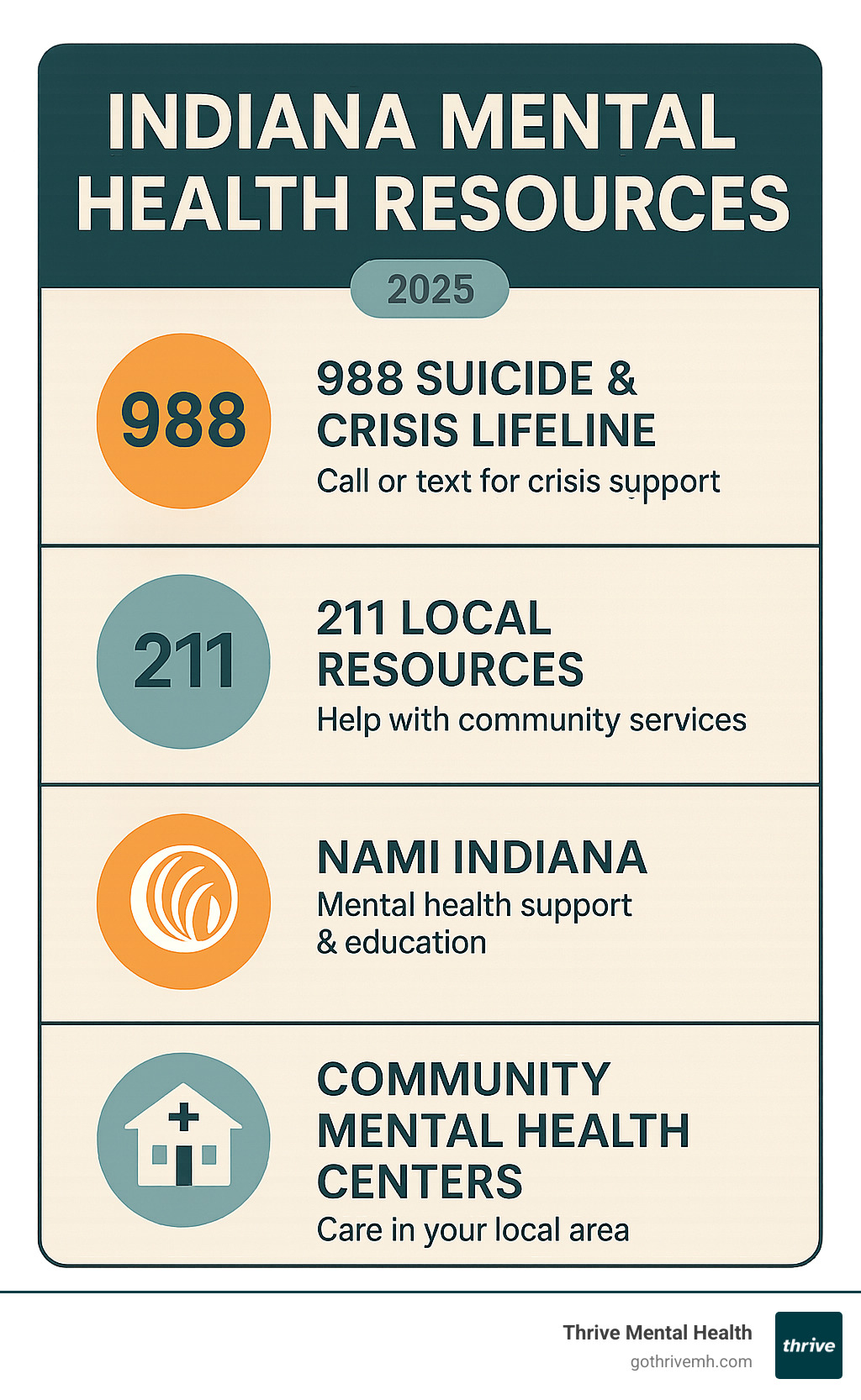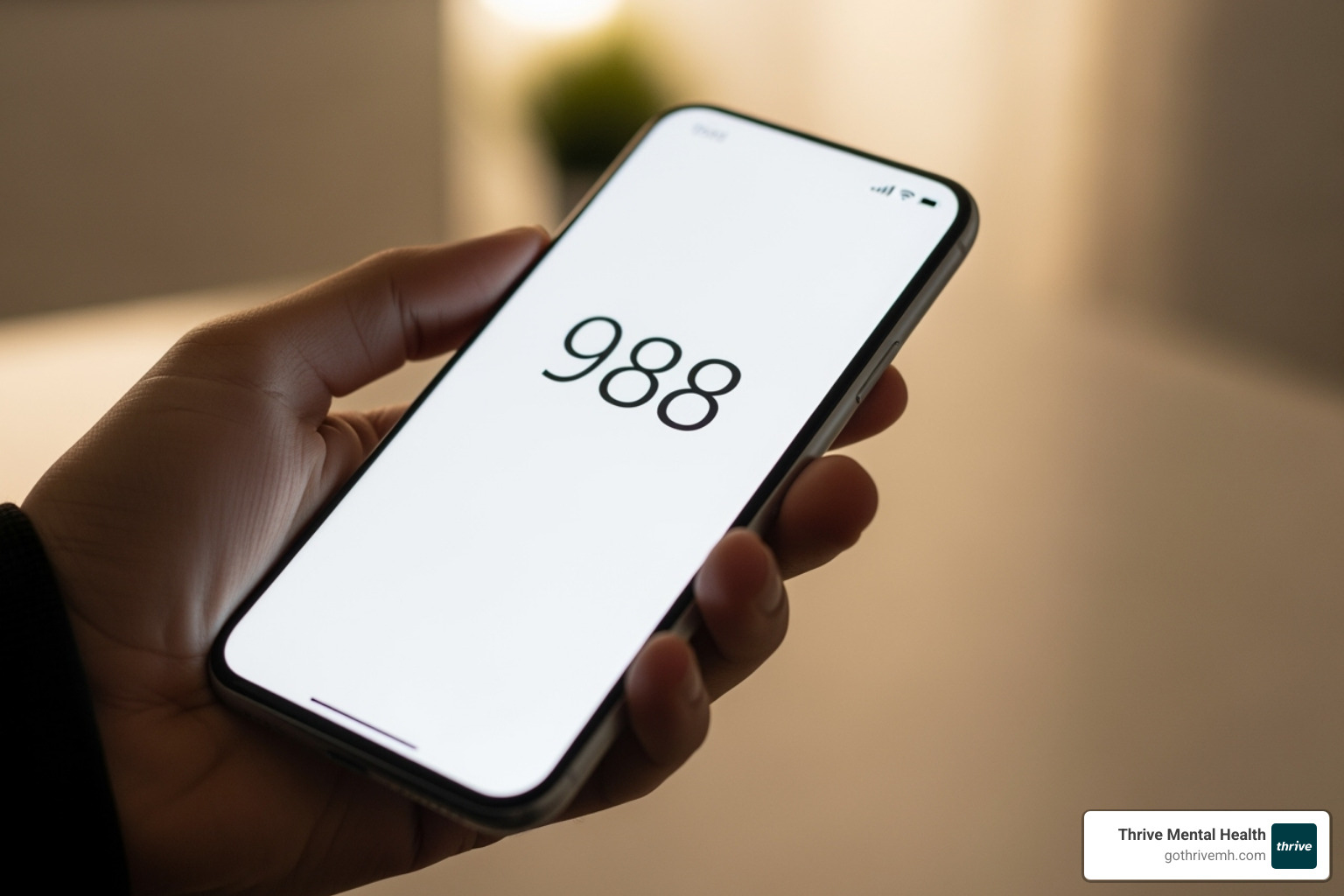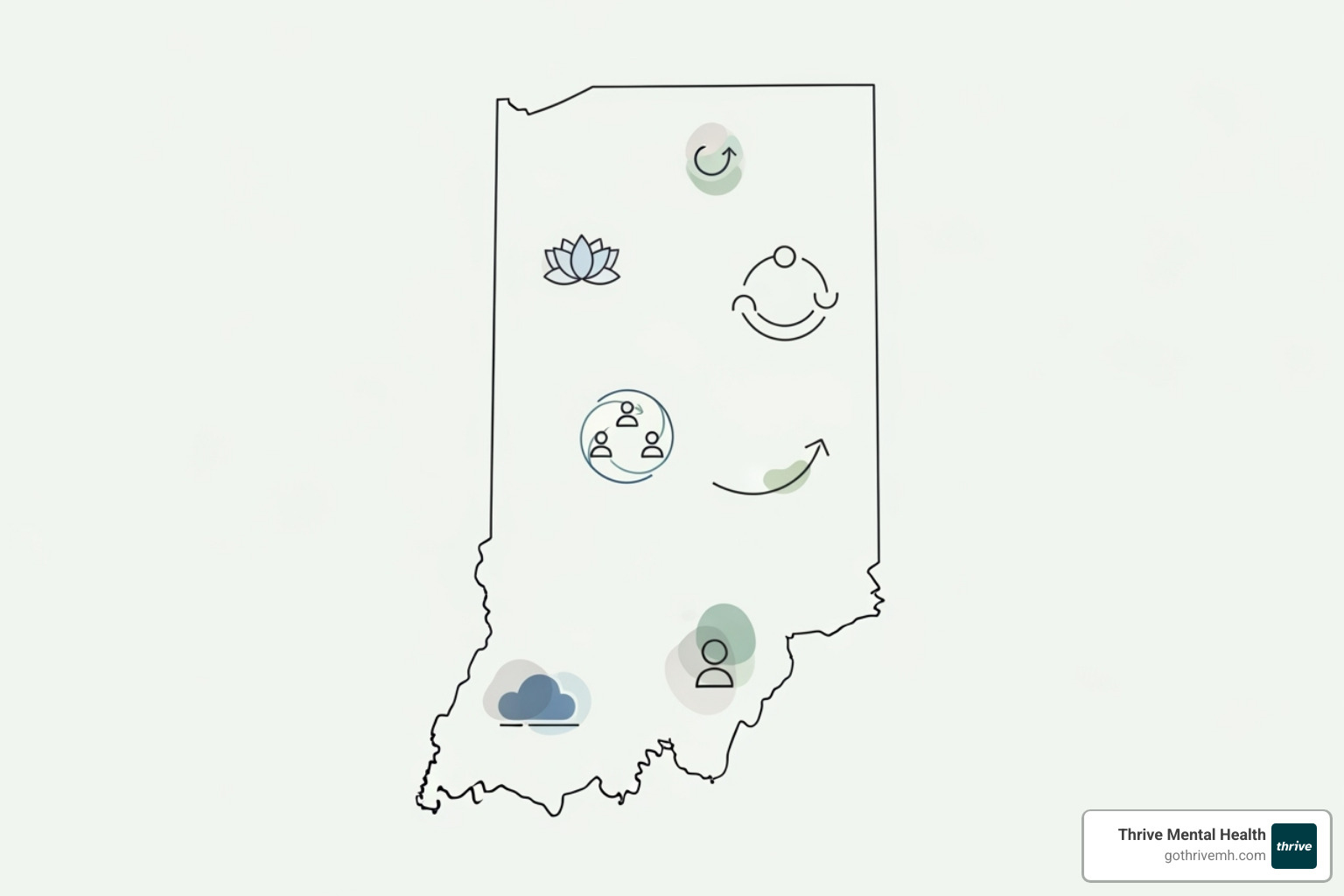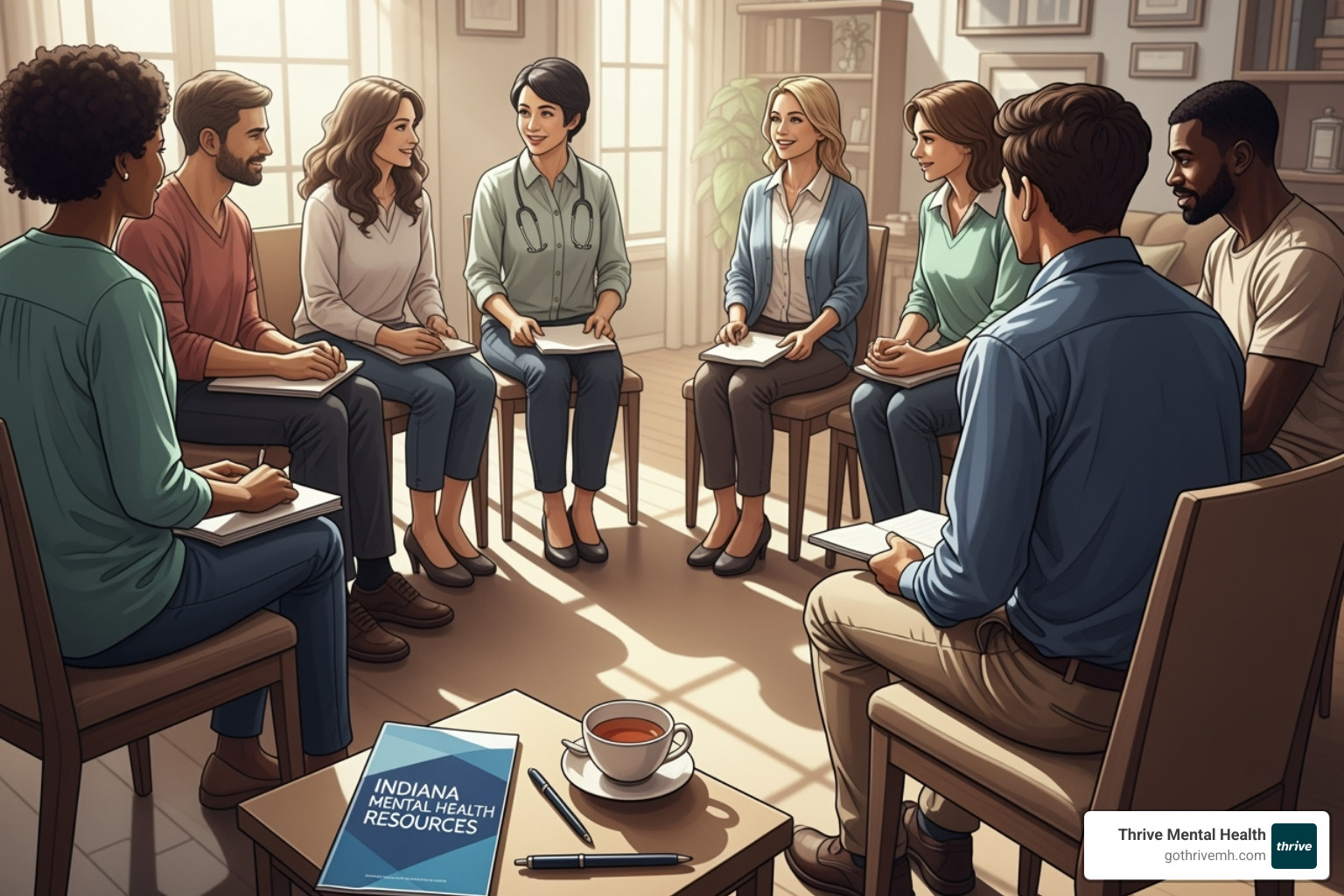Feeling Stressed? Indiana Mental Health Resources to the Rescue

Your Guide to Florida Mental Health Resources
Finding the right florida mental health resources can feel overwhelming, especially when you’re already struggling. We understand that navigating support options can be tough. In fact, a significant number of Floridians report symptoms of anxiety or depression each year, yet many find it difficult to access counseling or therapy. This guide aims to simplify that search.
If you need immediate help for mental health challenges in Florida, here are some key resources:
- Immediate Crisis Support:
- Dial or text 988 for the Suicide & Crisis Lifeline, available 24/7.
- Text HOME to 741741 to connect with the Crisis Text Line.
- Local Community Resources:
- Dial 211 to connect with a navigator for local resource assistance in Florida.
- General Support & Advocacy:
- Connect with NAMI Florida (National Alliance on Mental Illness) for support groups, education, and crisis planning.
- Visit Mental Health America of Florida for news, initiatives, and additional resources.
- Comprehensive Local Care:
- Contact your local community mental health provider for accessible services, which often have sliding scale fees.
I’m Nate Raine, CEO of Thrive. I champion solutions addressing critical mental health needs and actively build partnerships that expand access to care across florida mental health resources. This guide leverages our expertise to connect you with the support you deserve.

Immediate Crisis Support: Where to Turn for Urgent Help
When you’re in the middle of a mental health crisis, every moment counts. The good news? Florida has several lifelines ready to help you 24/7, staffed by people who truly care and understand what you’re going through.
These aren’t just phone numbers – they’re bridges to hope. The trained specialists on the other end know that reaching out takes courage, and they’re there to meet you exactly where you are, without judgment.
988 Suicide & Crisis Lifeline
Think of 988 as your mental health emergency room – always open, always there when you need it most. Whether you’re dealing with thoughts of suicide, struggling with substance use, or simply feeling overwhelmed by life, the 988 Suicide & Crisis Lifeline connects you with trained crisis specialists who get it.
Calling or texting 988 is probably the easiest step you can take when everything feels impossible. These specialists offer confidential care in a safe space where you can share what’s really going on. They’re trained to help with mental health distress of all kinds – anxiety that won’t quit, depression that feels endless, grief that’s crushing you, or substance use support when addiction feels like it’s winning.
Across the country, the 988 system is expanding to include services like mobile crisis teams that can bring help to you. These teams often include mental health professionals and peers with lived experience who can provide support right in your community.
If talking on the phone feels too overwhelming, you can text HOME to 741741 to connect with the Crisis Text Line. Sometimes typing feels easier than speaking, and that’s perfectly okay.
Reaching out isn’t giving up – it’s fighting back. If you’re struggling or know someone who is, don’t wait. Connect with the 988 Suicide & Crisis Lifeline, and if you’re curious about what to expect when you call a crisis line, that information can help ease any worries about taking that first step.

State-Level and Community Florida Mental Health Resources
It’s truly wonderful to know that Florida is dedicated to building a strong network of mental health services. From programs run by the state government to initiatives right in your own neighborhood, these resources are here to help Floridians get the care they need. Think of it as a broad, caring safety net designed to support our well-being.

Florida Department of Children and Families (DCF)
Leading the way in mental health and addiction services for Florida is the Florida Department of Children and Families (DCF). Their Substance Abuse and Mental Health (SAMH) Program is the architect behind many of the services you’ll find. They create policies, manage funding, and work hard to make sure a wide range of programs are available across our state.
DCF plays a huge role in setting the standards for care and making sure resources are there for both mental health and addiction treatment and prevention. They oversee a network of local providers to deliver services for adults and children, focusing on recovery and community integration. You can learn more about the DCF SAMH services they oversee.
211 Florida
Ever wish there was one easy place to find local support? That’s exactly what 211 Florida is! Think of 211 as your direct line to community help. By simply dialing 2-1-1, you can connect with a trained navigator. These friendly navigators can give you information on all sorts of local resources – from food pantries and housing help to utility assistance and, of course, mental health services right in your specific community. It’s a free, confidential, and accessible service for everyone in Florida.
Local Mental Health Providers
At the heart of Florida’s local mental health landscape are the community-based providers. These centers are the backbone of accessible care. They offer a range of mental health and addiction services right within our communities, making it much easier to get the help you need.
These providers offer services including crisis support, outpatient therapy, medication management, and case management. They are designed to be integrated care providers, meaning they look at both your mental and physical health needs. There are providers serving every region of Florida, meaning local support is available no matter where you call home. For those needing a higher level of care, providers like Thrive Mental Health offer specialized virtual and in-person programs, such as intensive outpatient (IOP) and partial hospitalization (PHP) programs, for adults and young professionals.
These centers are vital for reaching people who might otherwise struggle to access care, especially those with limited income or no insurance. Many offer services on a sliding scale, which means the cost of your care is adjusted based on what you can afford. This helps remove financial barriers, making sure treatment is within reach for more people. You can find local providers by contacting 211 or your regional NAMI Florida chapter.
Finding a Provider and Support for Specific Concerns
Once you’ve explored immediate crisis support and understood the broader state and community structures, the next step is often finding a specific provider or support group custom to your needs. Whether you’re dealing with anxiety, depression, substance use, or other concerns, Florida offers various avenues to connect with the right help.

How to Find Local Florida Mental Health Resources and Providers
Finding the right mental health provider doesn’t have to feel overwhelming. With the right tools and approach, you can locate appropriate florida mental health resources that match your specific needs and circumstances.
Thrive Mental Health Florida Services offers virtual and in-person intensive outpatient (IOP) and partial hospitalization (PHP) programs specifically designed for adults and young professionals. Our approach is flexible, expert-led, and evidence-based, custom to individual needs and accessible from anywhere. We focus on providing serious, effective, and accessible solutions for people in crisis, with immediate access to care in as little as 24 hours.
We accept major insurance providers, including Florida Blue (BCBS), Aetna, and Medicaid, among others, making our services more accessible to Floridians across the state.
When searching for providers, filtering by insurance acceptance can save you significant time and effort. Always inquire about insurance acceptance when contacting providers, and use online directories that allow you to filter by your specific insurance provider to streamline your search.
Filtering by specialty is equally important. Providers often specialize in certain conditions like anxiety, depression, trauma, or ADHD, or focus on specific therapeutic approaches like CBT or DBT. Finding a therapist with expertise in your area of concern can make a meaningful difference in your treatment outcomes.
Finding the right fit for therapy is a personal journey. Don’t hesitate to ask questions about a therapist’s experience, approach, and what to expect during sessions.
Support for Substance Use Disorders
Substance use disorders affect countless Floridians, and thankfully, a growing number of florida mental health resources are dedicated to supporting recovery with compassion and evidence-based approaches.
Thrive Mental Health Substance Use Support provides comprehensive, personalized treatment through our intensive outpatient (IOP) and partial hospitalization (PHP) programs. We focus on evidence-based therapies, peer support, and family involvement to help individuals achieve lasting recovery in a supportive environment.
Peer Recovery Coaches play an invaluable role in the recovery process. These individuals, often with lived experience in recovery, provide guidance, mentorship, and support to others navigating their own recovery journeys. Organizations like NAMI Florida can help connect individuals with peer recovery resources.
For those struggling with tobacco use, Tobacco Free Florida (1-877-U-CAN-NOW) offers free coaching and resources to help individuals quit smoking and other tobacco products. It’s a supportive first step toward better overall health.
Peer and Family Support Groups
Mental health challenges often feel isolating, but support groups offer a powerful sense of community and understanding. In Florida, peer and family support are cornerstones of the mental wellness landscape, providing hope and practical guidance.
Thrive Mental Health Peer Support recognizes the profound impact of shared experience. Our programs integrate peer support specialists who have walked similar paths, providing invaluable empathy and guidance that only comes from lived experience.
The Family-to-Family program through NAMI Florida offers a free, 8-session educational program for family members, caregivers, and friends of individuals living with mental illness. It provides critical information and practical coping skills that can transform how families steer mental health challenges together.
Peer support specialists, often certified through specific training programs, use their lived experience to support others in recovery. They offer hope and practical strategies, showing that recovery is possible and that no one has to face their struggles alone.
Local chapters of organizations like NAMI Florida operate across the state, offering regular support group meetings, educational seminars, and crisis planning resources for individuals and families. These groups foster an environment where individuals can share their experiences, learn from others, and realize they are not alone in their struggles.
Specialized Support for Diverse Floridian Communities
Mental health challenges don’t affect everyone the same way. Different communities face unique barriers and need care that truly understands their experiences. Fortunately, Florida has developed florida mental health resources specifically designed to meet the diverse needs of all Floridians, regardless of age, background, or identity.

Mental Health Resources for Florida Youth
Young people in Florida are facing unprecedented mental health challenges. Statistics show that half of all mental illnesses begin by age 14, reminding us why specialized youth support is so critical.
Florida’s Department of Children and Families (DCF) works to improve access to mental health services for children and teens with serious emotional challenges. This state-level program recognizes that early intervention can change the trajectory of a young person’s life.
For LGBTQ+ youth specifically, organizations like the Zebra Coalition in Central Florida provide safe spaces and wellness programming. These young people often face additional stressors related to identity and acceptance, making specialized support essential.
National resources like The Jed Foundation complement these local efforts by providing suicide prevention resources and counseling services specifically designed for teens and young adults navigating this crucial developmental period.
Assistance for Veterans and Military Families
Our veterans and military families carry invisible wounds alongside their visible service. The transition from military to civilian life, combat trauma, and the unique stressors of military culture require specialized understanding and care.
The Florida Veterans Foundation provides comprehensive services and connects veterans to mental health and addiction treatment. They understand that stable housing and basic needs must be met before deeper healing can begin.
Every county in Florida has County Veteran Service Officers who serve as local guides, helping veterans and their families steer the complex web of benefits, healthcare, and mental health services available through the Department of Veterans Affairs. Additionally, providers like Thrive Mental Health offer programs that can support veterans and their families, accepting TRICARE to ensure care is accessible for military members and their loved ones.
When crisis strikes, veterans have their own dedicated support line. They can call or text 988 and press 1, or text 838255 for immediate, confidential support from counselors who understand military culture and experience.
SAMHSA’s Veterans & Military Families resources and the Real Warriors Campaign work nationally to reduce stigma and encourage help-seeking behavior among service members and veterans – because asking for help takes real courage.
Support for LGBTQ+ Floridians
LGBTQ+ individuals often face higher rates of anxiety, depression, and suicidal thoughts due to societal stigma and discrimination. Finding affirming care that celebrates rather than merely tolerates their identity is crucial for healing.
Organizations like The Center Orlando and SunServe in South Florida support LGBTQ+ individuals and their families. They provide resources, support groups, and referrals to providers who understand the unique challenges of the community.
For LGBTQ+ youth in crisis, The Trevor Project operates a 24/7 hotline (1-866-488-7386) with counselors specially trained in LGBTQ+ youth issues. Trans Lifeline (1-877-565-8860) offers peer support specifically run by and for trans people, providing both emotional and practical support during difficult times.
Resources for BIPOC Communities
The mental health of Black, Indigenous, and People of Color (BIPOC) communities is deeply impacted by systemic racism and historical trauma. Culturally responsive florida mental health resources aren’t just helpful – they’re essential for effective care.
State and local chapters of NAMI and Mental Health America can often connect you with culturally competent providers who understand how racism and discrimination affect mental health.
National resources complement local efforts. The Asian Mental Health Collective provides resources and a therapist directory for Asian communities, while Latinx Therapy offers similar support for Latinx individuals seeking culturally affirming care.
Some organizations offer therapy scholarships specifically for African American girls and women, recognizing that financial barriers shouldn’t prevent access to culturally competent mental health care.
Finding care that honors your full identity – your culture, your experiences, and your community – isn’t just nice to have. It’s often the difference between treatment that works and treatment that doesn’t. These specialized resources exist because your whole self deserves to be seen, understood, and supported.
Navigating Insurance, Financial, and Educational Resources
Understanding how to pay for mental health care shouldn’t add stress to your healing journey. The good news? Florida offers multiple pathways to make florida mental health resources more accessible, whether through insurance, financial assistance, or educational support that helps you understand your options.

Using Insurance for Mental Health Care
Most insurance plans are required to cover mental health services just like physical health services, but navigating the specifics can feel overwhelming. Let’s break it down in simple terms.
If you have a major insurance plan like Florida Blue (a BlueCross BlueShield plan), they offer resources to help members understand their mental health benefits. Many insurers also provide telehealth options, allowing for on-demand video visits with board-certified mental health professionals. This means you can access care from your living room, which can be a game-changer if you’re dealing with anxiety about in-person appointments or transportation challenges.
For Floridians with lower incomes, Florida Medicaid covers mental health services for eligible adults and children. This can be a lifeline for those who might otherwise go without care.
At Thrive Mental Health, we work with major insurance providers including commercial plans, Medicaid, and TRICARE to ensure our intensive outpatient and partial hospitalization programs are accessible. We believe financial barriers shouldn’t stand between you and the care you need.
Here’s a pro tip: always call your insurance provider directly to understand your specific mental health benefits. Ask about co-pays, deductibles, and whether your potential provider is in-network. This five-minute phone call can save you significant time and money.
Financial Assistance and Low-Cost Options
Don’t have insurance or facing high out-of-pocket costs? You still have options. Florida has a safety net of florida mental health resources specifically designed to help people access care regardless of their financial situation.
Local community providers across Florida are your best friend when it comes to affordable care. These centers typically offer services on a sliding scale based on your income, which means the less you earn, the less you pay. It’s that simple.
Many local and state programs provide financial assistance for substance use disorder treatment, recognizing that addiction doesn’t discriminate based on income, and neither should treatment. Dialing 211 is a great way to learn about programs in your area.
Some private providers also offer provider discounts based on family size and income. It’s always worth asking about payment plans or reduced-fee options when you first contact a potential provider.
Educational and Advocacy Organizations
Knowledge is power, especially when it comes to mental health. Several organizations in Florida are dedicated to education, advocacy, and breaking down the stigma that still surrounds mental health care.
Mental Health America of Florida leads the charge in mental health reform and advocacy throughout the state. They’re actively involved in legislative efforts and community-based reform. MHA also offers mental health screenings, which are free online tools that can help you identify potential mental health conditions and guide you toward appropriate resources.
NAMI Florida educational programs provide some of the most valuable learning opportunities available. Their Family-to-Family program is a free, 8-session course that gives family members, caregivers, and friends the knowledge and coping skills they need to support their loved ones. They also offer Peer-to-Peer programs and regular seminars that create communities of understanding and support.
These organizations understand that education and advocacy work hand in hand. The more people understand about mental health, the more likely they are to seek help when they need it, and the more supportive our communities become for those who are struggling.
Conclusion
Finding support for your mental health journey doesn’t have to feel impossible. Throughout this guide, we’ve explored the extensive network of florida mental health resources available to every Floridian, from immediate crisis support to long-term care options.
When you’re in crisis, help is just three digits away with 988, connecting you to trained specialists who understand what you’re going through. The state of Florida has built a solid foundation through organizations like the Department of Children and Families, while local mental health providers ensure that quality care reaches every community across the state.
We’ve walked through how to find the right therapist or support group for your specific needs, whether you’re dealing with anxiety, depression, or substance use challenges. The power of peer support and family involvement can’t be overstated – sometimes knowing you’re not alone makes all the difference.
Florida’s commitment to serving diverse communities shines through specialized resources for youth, veterans, LGBTQ+ individuals, and BIPOC communities. These florida mental health resources recognize that one size doesn’t fit all when it comes to mental wellness.
Navigating insurance and finding affordable care options might seem overwhelming, but with sliding scale fees at local providers, state programs, and comprehensive insurance partnerships, financial barriers don’t have to stand in your way. Educational organizations like Mental Health America of Florida and NAMI continue breaking down stigma and spreading awareness.
Here’s the truth: mental health conditions affect almost 1 in 4 people each year. You’re not broken, you’re not weak, and you’re definitely not alone. Reaching out for help takes real courage – it’s one of the strongest things you can do for yourself and the people who care about you.
At Thrive Mental Health, we’re proud to be part of Florida’s mental health landscape. Our intensive outpatient and partial hospitalization programs offer the flexibility and expert care you need, whether you prefer virtual sessions from home or in-person support. We accept major insurance providers and believe that everyone deserves access to quality mental health care.
Your journey toward better mental health starts with a single step. Whether that’s calling 988 in a crisis, reaching out to a local provider, or exploring Thrive Mental Health virtual therapy as a convenient and effective option, the important thing is taking that step. Florida’s mental health resources are here, ready to support you every step of the way.